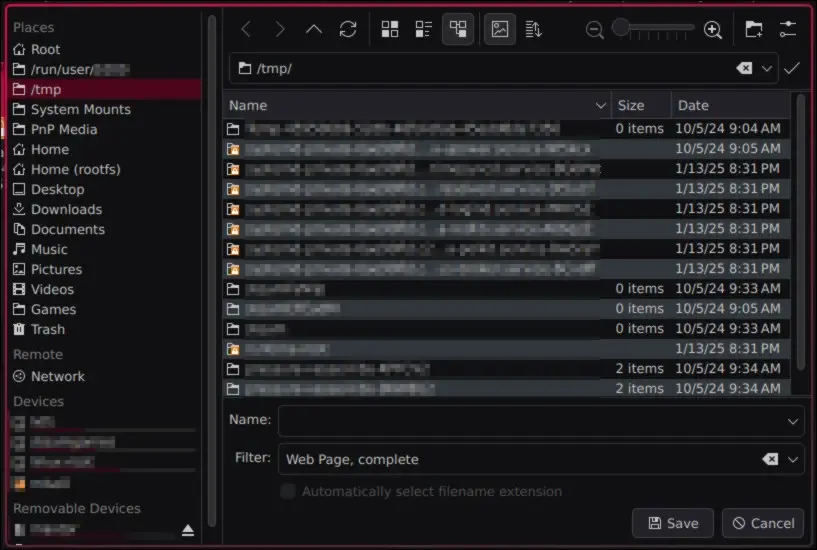I don’t think so, a cold birra often goes well with pizza
Sonotsugipaa
- 6 Posts
- 185 Comments
Lore-accurate Lunacid mana potions

 1·28 days ago
1·28 days agoI think GNOME’s filechooser is the GTK one (never used it so I’m not sure), mine looks like this:

It’s entirely possible that Firefox changed and now uses XDG portals by default, I configured it like this a long time ago.
As for how to configure it, I honestly don’t know.
It was a combination of messing withwidget.use-xdg-desktop-portalon about:config, and changing XDG envvars and dotfiles; both by following several conflicting Reddit and bbs.archlinux.org posts.

 4·28 days ago
4·28 days agoXDG portal filechooser for Firefox: the KDE implementation uses Dolphin, which is full of features and I use most of them; the default GTK one is mildly infuriating to use and looks ugly too, but getting the browser to use the portal I want was a nightmare - especially since GTK discontinued the GTK_USE_PORTAL envvar.
The related Firefox config entries make no sense either.

 6·1 month ago
6·1 month agoHere it is:
#!/usr/bin/zsh nl=$'\n' dnl=$'\n\n' url=$1 msgcontent=$url; shift argi=1 for arg ($@); do argi=$(($argi + 1)) msgcontent=${msgcontent}${nl}Argument\ ${argi}': '${arg} done title="${0:A}" msg="An application attempted to open a web page:${dnl}\"${msgcontent}\"${dnl}Copy the URL to clipboard?" kdialog --title $title --yesno $msg answer=$? if [[ $answer = 0 ]]; then wl-copy $url; fiIf you want to translate it to Bash, keep in mind that arrays behave differently between the two shells, and syntax like
for arg ($@); dowould likely misbehave or not work at all.Also, there’s an issue where some applications do something weird, and the URL seems to be a zero-length argument. I have absolutely no idea what’s up with that.

 10·1 month ago
10·1 month agoYou can set some browser-unrelated program or script as your desktop environment’s default browser, for example I wrote a Zsh script that creates a KDE dialog and asks me to copy the URL to the clipboard.
I’m not currently at my PC, but if you want it I can paste it in a comment here when I get to it - it shouldn’t be too hard to translate it to Bash, either.
Other than that?
/usr/bin/trueis a pretty nice default browser for applications to start without your consent, very minimal and lightweight.

 2·1 month ago
2·1 month agoOh,
std::enable_ifis straight up worse, they’re unreadable and don’t work when two function overloads (idk about variables) have the same signature.I’m not even sure enable_if can do something that constraints can’t at all…

 2·1 month ago
2·1 month agoI imagine reflections would make the process more straightforward, requires expressions are powerful but either somewhat verbose or possibly incomplete.
For instance, in your example
foocould have any of the following declarations in a class:void foo();int foo() const;template <typename T> foo(T = { }) &&;decltype([]() { }) foo;

 1·1 month ago
1·1 month agoSpaces between paragraphs should work, you have to use two new lines for them.
They seem to work on my instance’s web interface and on Jerboa…

 2·1 month ago
2·1 month agoTip:
you can replace your periods with three dashes to get a horizontal separator, which I think is what you were going for. It’s markdown syntax, it should work for most clients.

 2·1 month ago
2·1 month agoYeah, that’s what I was thinking of. I don’t know how C++ could reasonably have Java-like reflections anyway…

 2·1 month ago
2·1 month agoWouldn’t compilers be able to optimize runtime things out? I know that GCC does so for some basic RTTI things, when types are known at compile time.

 11·1 month ago
11·1 month agoI can see the footguns, but I can also see the huge QoL improvement - no more
std::enable_ifspam to check if a class type has a member, if you can just check for them.… at least I hope it would be less ugly than
std::enable_if.

 6·2 months ago
6·2 months agoJava²script
The joke has been lost because the drive’s technology is ill-suited for permament storage.
If only we had a hard drive…
Nah, it’s just that
/procis incorrect - it contains information about running processes, as well as kernel data structures as visible by the process reading them.
Wdym? flamingo_pinyata’s explaination was quite useful, I wish somebody had told me that long ago and it’s still going to let me save so much time.
It feels like
/opt's official meaning is completely lost on developers/packagers (depending on who’s at fault), every single directory in my/optbelongs to standalone software that should just be put into either/usr/libor/usr/sharewith some symlinks or scripts into/usr/bin.

 41·2 months ago
41·2 months ago… for the next 3 months, until a security update makes its way onto your device and also coincidentally breaks GRUB, hey look Recall is now enabled and opt-out.




That is an extremely oddly specific cysec issue they’re choosing to target…